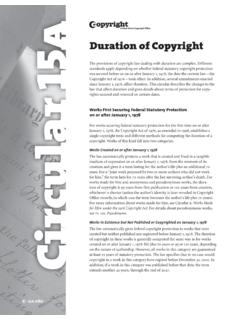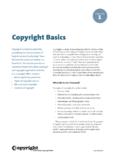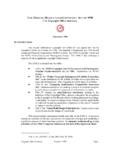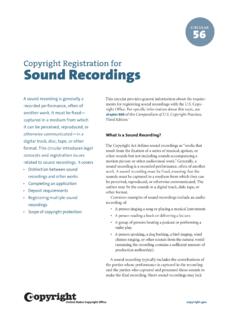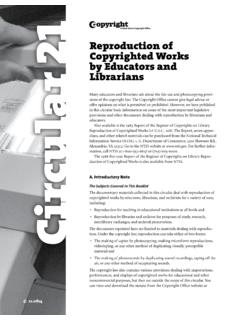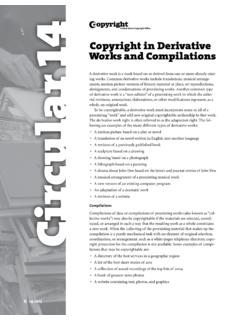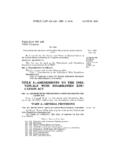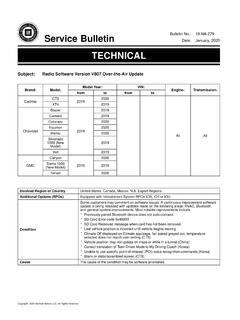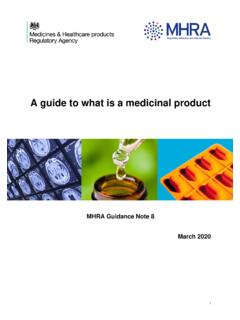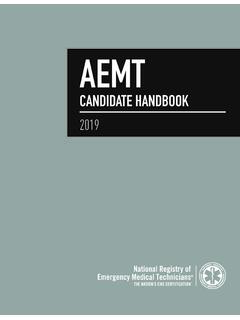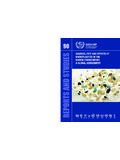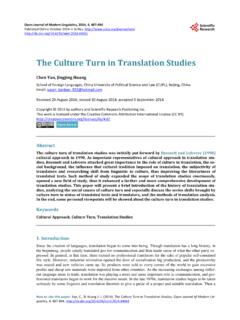Transcription of How to Obtain Permission
1 5 How to Obtain PermissionPermission is not required for every use of a copy-righted work, and not all unauthorized uses are infringing. But copyright law gives owners of copy-righted works a bundle of exclusive rights, including the right to reproduce their works or authorize others to reproduce them, subject to certain limitations defined in sections 107 through 122 of the copyright law. To determine if a particular use requires permis-sion from a copyright owner, you need to evaluate whether one of these limitations applies to the use. The copyright Office cannot grant Permission to use copyrighted many situations, securing Permission is the most certain way to ensure an intended use is not an infringement of the copyright owner s rights. For more information about limitations to copyright law, see fl 102, Fair Step: Research copyright StatusOnce you determine that obtaining Permission to use a copyrighted work is warranted, the first step is to research its copyright Consult the location on a work or its packaging that displays a copyright notice (such as the copyright page of a book or the legal notice on a website).
2 Many works will have a copyright notice, which helps to identify the owner of a use of a copyright notice to secure copyright protection is no longer required under law. For works published on or after March 1, 1989, use of the copyright notice is optional. So the absence of a notice does not mean a work can be freely copied, adapted, distributed, publicly displayed, or keep in mind that copyright ownership can be transferred after publication, so the owner specified in a copyright notice may not be the current owner. Only the current copyright owner of the exact material to be used can grant Permission for its works may contain material originally pub-lished elsewhere, which the copyright owner of the larger work obtained Permission to publish. For clues about whether material included in a larger work may belong to someone other than the owner specified in the copyright notice, check to see if a work contains credits or an acknowledgment.
3 If a work does not contain a copyright notice, or you cannot locate the person or entity identified in the notice, contact the author or publisher of the work, who may control the rights or be able to refer you to the current copyright may also want to consult copyright Office records of registrations and transfers of ownership. Records created after December 31, 1977, are available on the Office s website, ; pre-1978 records are searchable in the copyright Office. Com-pilations of pre-1978 copyright registrations are also searchable at more information about researching the copy-right status of works, see Circular 22, How to Investigate the copyright status of a Work, available on the Office s Step: Contact copyright Owner Once you have determined the identity of the copy-right owner, you will need to contact that person to request Permission to use the representing publishers report that delays in granting permissions often arise because copyright owners receive inaccurate or incomplete information.
4 Listed below are some facts that copyright owners typically need to know to process permissions requests. The nature of your project and the material you want to use will determine the specific facts you will need to supply. Author s, editor s, translator s full name(s) Title and other details about the work, such as edi-tion or volume number, if applicable Exact material to be used, giving the amount or portion(s) of the work to be used, with as much specificity as possible copyright date of the workOne way to make sure your intended use of a copyrighted work is lawful is to Obtain Permission or a license from the copyright S. copyright Office Library of Congress 101 Independence Avenue SE Washington, DC 20559 Use to be made of the material Audience to whom the work will be distributed or otherwise made available Whether or not the material is to be sold Name and nature of your organization (for exam-ple, non- or for-profit) Your name and contact detailsContact a copyright owner or author as far as pos-sible in advance of when you want to use the material specified in your permissions request.
5 The first person you contact may not control the rights and may have to refer you to the correct copyright owner, or may need time to research the extent to which Permission can be a publisher published the work, direct your inquiry to the publisher s rights and permissions department. Although many publishers grant usage rights to noncommercial organizations at no charge or a minimal charge, publishers may first have to deter-mine whether they have the right to do soYou can also research contact details for individual authors through the copyright Office s records. Note1. This document draws on Questions and Answers on Copy-right for the Campus Community published in 2002 by the Association of American Publishers, the Association of American University Presses, the copyright Clearance Center, the National Association of College Stores, and the Software and Information Industry rev: 08 2013 Printed on recycled paper government printing office: 2013.
